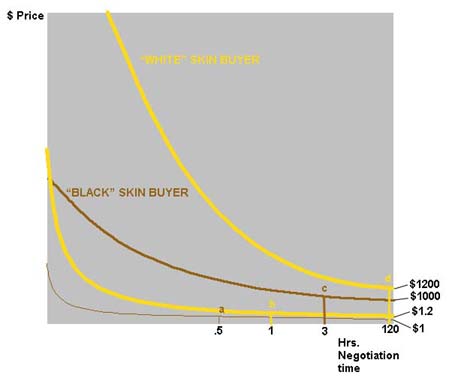The issue is summarized in the graph below.

Picture: A dynamic African price negotiation model with 20% skin tax. The seller is "black". It shows time paths for a $1 and a $1000 product, both for "white" and "black" buyers. Axes: logarithmic scale
First offers for a $1 product: 300% for blacks, 5000% for whites. First offers for a $1000 product: 150% for blacks, 300% for whites.
Bottoming (at 20% skin tax) for a $1 product: afer 30 minutes at $1 for blacks (point a), after 1 hour at $1.20 for whites (point b). Bottoming (at 20% skin tax) for a $1000 product: afer 3 hours at $1000 for blacks (point c), after 120 hours at $1200 for whites (point d).
In the West, this would be a self destroying prophecy: knowing the outcome of time consuming processes would induce actors to skip them. think of how players in a chess game agree remise long before they start repeating moves. This type of foresight, however, requires analytical capacities not available in the negotiating African public.
The graph gives my personal rough estimate of parameters, but is of course stil to be be scientifically fitted to African reality by sound econometrical measurement (for which I am far too lazy).
Conclusion: In Africa, time is money
Time is money....for blacks.....for whites. Indians????
Application to corrupt bargaining
Most bargaining in Africa is corrupt bargaining (definition)
Mearsk scandal. Transport of three big crates with personal effects from Rotterdam to Kampala. Everybody, Kenya customs, Maersk and Kampala customs tried to use time as a weapon to milk me. The transport, scheduled to last one months, took more than a year because I refused to pay bribes. The grand final was at Kampala customs (all offices exclusively for Banyankole Bahima, the tribe of the president): Maersk gave them my crates. Customs put them in a Vietnam rice store full of rats, opened them, and waited for me to come and offer my bribe. They had bad luck: I did not care for the rats and did not need the goods quickly. So, they failed to get any money from me, and satisfied themselves by stealing a good suit from my crates. During all that, my "customs clearing agent" Maersk just waited for what was to come, I probable was "given" by Maersk to the customs in exchange for some other benefit. (details)